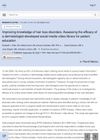 1 citations,
August 2023 in “Journal of the American Academy of Dermatology”
1 citations,
August 2023 in “Journal of the American Academy of Dermatology” Dermatologists should be aware of and manage alopecia risks from certain cosmetic procedures.
 1 citations,
July 2023 in “Cancers”
1 citations,
July 2023 in “Cancers” Skin side effects from CDK4/6 inhibitors in breast cancer patients are generally mild and treatable, allowing most patients to continue treatment.
 1 citations,
June 2023 in “Dermatology and therapy”
1 citations,
June 2023 in “Dermatology and therapy” People with Alopecia Areata have more herpes simplex infections but similar rates of cancer, blood clots, and heart disease compared to those without it.
 1 citations,
June 2023 in “Journal of Dermatology”
1 citations,
June 2023 in “Journal of Dermatology” People with Alopecia Areata are more likely to have autoimmune diseases, inflammatory diseases, and mental health issues like anxiety and depression.
 1 citations,
April 2023 in “American Journal of Clinical Dermatology”
1 citations,
April 2023 in “American Journal of Clinical Dermatology” Chronic telogen effluvium may not be a unique condition and could be confused with other types of hair loss.
 1 citations,
March 2023 in “Clinical, Cosmetic and Investigational Dermatology”
1 citations,
March 2023 in “Clinical, Cosmetic and Investigational Dermatology” Current treatments for Alopecia Areata have mixed success, and there's a need for better, more accessible options and support for affected individuals.
1 citations,
February 2023 in “Animals”  1 citations,
January 2023 in “SAGE open medical case reports”
1 citations,
January 2023 in “SAGE open medical case reports” A new treatment called deucravacitinib helped a patient with severe hair loss grow their hair back quickly.
 1 citations,
December 2022 in “JAMA Dermatology”
1 citations,
December 2022 in “JAMA Dermatology” The AI system HairComb accurately scores hair loss severity, matching dermatologist assessments.
 1 citations,
December 2022 in “JAAD international”
1 citations,
December 2022 in “JAAD international” Social media videos made by dermatologists significantly improved patient knowledge about hair loss.
 1 citations,
September 2022 in “Journal of dermatological science”
1 citations,
September 2022 in “Journal of dermatological science” Certain vitamins and their derivatives can help hair grow longer by activating specific growth signals.
 1 citations,
August 2022 in “JAAD case reports”
1 citations,
August 2022 in “JAAD case reports” Pioglitazone use was linked to hair regrowth in a patient with permanent hair loss from cicatricial alopecia.
 1 citations,
December 2021 in “JAAD case reports”
1 citations,
December 2021 in “JAAD case reports” A woman with severe hair loss saw significant hair regrowth after adding platelet-rich plasma injections to her treatment with tofacitinib.
1 citations,
January 2021 in “Clinical case reports” The Hotz-Celsus surgery successfully fixed inward-turning eyelids in cattle.
 1 citations,
October 2020 in “Journal of Investigative Dermatology Symposium Proceedings”
1 citations,
October 2020 in “Journal of Investigative Dermatology Symposium Proceedings” The summit concluded that new treatments like Jak inhibitors show promise for Alopecia Areata and personalized approaches are needed.
1 citations,
December 2019 in “Frontiers in endocrinology” Higher androgen levels during puberty are linked to shorter adult height in boys with Silver-Russell syndrome.
 November 2024 in “Journal of the European Academy of Dermatology and Venereology”
November 2024 in “Journal of the European Academy of Dermatology and Venereology” Long-term baricitinib treatment can lead to significant scalp hair regrowth in patients initially showing only eyebrow or eyelash regrowth.
 October 2024 in “Journal of the European Academy of Dermatology and Venereology”
October 2024 in “Journal of the European Academy of Dermatology and Venereology” Ritlecitinib and baricitinib are similarly effective for hair regrowth in severe alopecia areata.
 October 2024 in “JEADV Clinical Practice”
October 2024 in “JEADV Clinical Practice” UK dermatologists commonly use corticosteroids and minoxidil to treat hair loss conditions.
 October 2024 in “JAAD Case Reports”
October 2024 in “JAAD Case Reports” Dutasteride mesotherapy showed mixed results and is not recommended as a primary treatment for hair loss.
 September 2024 in “Journal of Cosmetic Dermatology”
September 2024 in “Journal of Cosmetic Dermatology” Low-dose oral minoxidil can cause serious side effects like heart issues, so use the lowest effective dose.
 September 2024 in “Journal of the European Academy of Dermatology and Venereology”
September 2024 in “Journal of the European Academy of Dermatology and Venereology” Baricitinib effectively reduces hair loss in severe alopecia areata with mild side effects.

Certain drugs can worsen hair loss in people prone to androgenetic alopecia.
 August 2024 in “Nutrition Bulletin”
August 2024 in “Nutrition Bulletin” GLP-1 receptor agonists help with weight loss but need to be combined with other treatments for best results.
 August 2024 in “Current Protocols”
August 2024 in “Current Protocols” The C3H/HeJ mouse model is useful for studying and testing treatments for alopecia areata.
 July 2024 in “JAAD Case Reports”
July 2024 in “JAAD Case Reports” Corticosteroid injections for hair loss may cause eye problems, so caution is needed.
 June 2024 in “JEADV Clinical Practice”
June 2024 in “JEADV Clinical Practice” Severe alopecia areata patients have a low chance of spontaneous hair regrowth.
 June 2024 in “ESMO Gastrointestinal Oncology”
June 2024 in “ESMO Gastrointestinal Oncology” The combination treatment showed a higher response rate but no significant survival benefits.
 May 2024 in “JAMA Dermatology”
May 2024 in “JAMA Dermatology” Oral contraceptive use may increase the risk of frontal fibrosing alopecia in women with a specific CYP1B1 gene variant.
April 2024 in “Cosmetics” Wigs help improve self-esteem and quality of life for people with hair loss from alopecia areata.


























